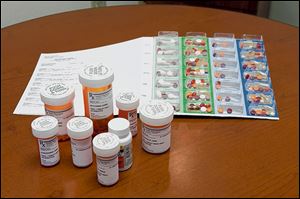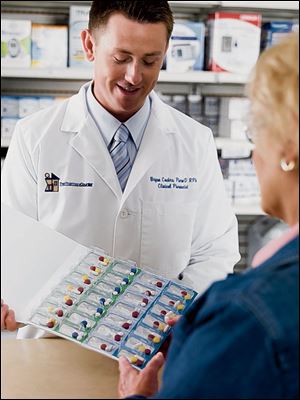
Managing your meds
Pharmacy program tries to ensure patients take multiple pills when they should
1/23/2012
Blister packs help ensure better outcomes with patients.

It can be confusing when taking multiple prescriptions. Individually tailored blister packs can make it easier.
A new program to help patients keep better track of their prescribed medications is designed to ensure they take their pills at the proper time each day and in the correct dosages.
Bryan Coehrs, director of pharmacy for the Pharmacy Counter and ProMedica outpatient pharmacies, said the multidose adherence program combines individual patient packaging and patient adherence.
Though the Pharmacy Counter is just the second in the nation to use the robotic system designed for this program, other firms use various forms of the packaging, he said.
In this case, a patient's medications are put into packages similar to over-the-counter meds. Like OTC drugs, these meds are punched through a foil-type backing and organized according to the day and time to be taken.
"A company in Arkansas was the first to use the robotics," Mr. Coehrs said in reference to an independent chain of pharmacies near Little Rock.
"But to put the whole program together, that was us," he said, referring to the hands-on contact pharmacists make with patients. "The robotic company that did this had never heard of this adherence part. So it's a new model of pharmacy, a higher-touch pharmacy for a higher-risk population."
This was a perfect move for the Pharmacy Counter because it was already working with patients to improve patient outcomes.

Pharmacist Bryan Coehrs.
"It was a natural thing to work with patients to ensure better outcomes, and it happens to fit with the ProMedica model to keep people in their homes and to make sure their meds work properly," Mr. Coehrs said.
Pharmacists explain why patients need different medications and why they must follow prescribed orders.
"People don't take their meds right. Many times people have multiple diseases, multiple doctors," he said.
That can overwhelm and confuse patients, but he added that "a more educated patient is a more adherent patient and therefore is a more healthier patient."
The adherence segment of this program also reduces the costs that result when medications are wasted.
"There is a lot of money spent and wasted in the United States on people not taking their meds correctly," Mr. Coehrs said.
Annually, Medicare sees about $175 billion wasted as a result of patients not adhering to prescribed directions, he said. One example of this "medication misadventure" is a patient who takes too much or too little blood pressure medication, becomes ill, and ends up in the hospital for days.
The Pharmacy Counters' 210 patients in this endeavor pay no additional cost. Each takes an average of 10 medications every day. Those interested in joining the program must take their meds with them to an appointment with a pharmacist, who then records and screens prescriptions to double check for drug interaction.
Another goal is to reduce the number of times meds must be taken each day.

Blister packs help ensure better outcomes with patients.
"If I can get them to take meds two times a day, that would be a success. It's easier to remember to take them two times a day, and we want to make it easier for them," Mr. Coehrs said.
However, no schedule is changed without doctors' authorization.
Medications go into packages that contain a week's worth of drugs that are then delivered to patients via U.S. Postal Service or pharmacy delivery. When it's time for refills, the pharmacy contacts patients to review concerns.
"People in it love it. We talk once a month with patients. It's a unique model of pharmacy that doesn't exist in this day and age. It's not just seniors, but middle-age patients who have complicated medication regiments," Mr. Coehrs said.
"We know that there is a lot of money and lots of pain and suffering when people are not taking their meds properly."
Contact Rose Russell at rrussell@theblade.com or 419-724-6178.